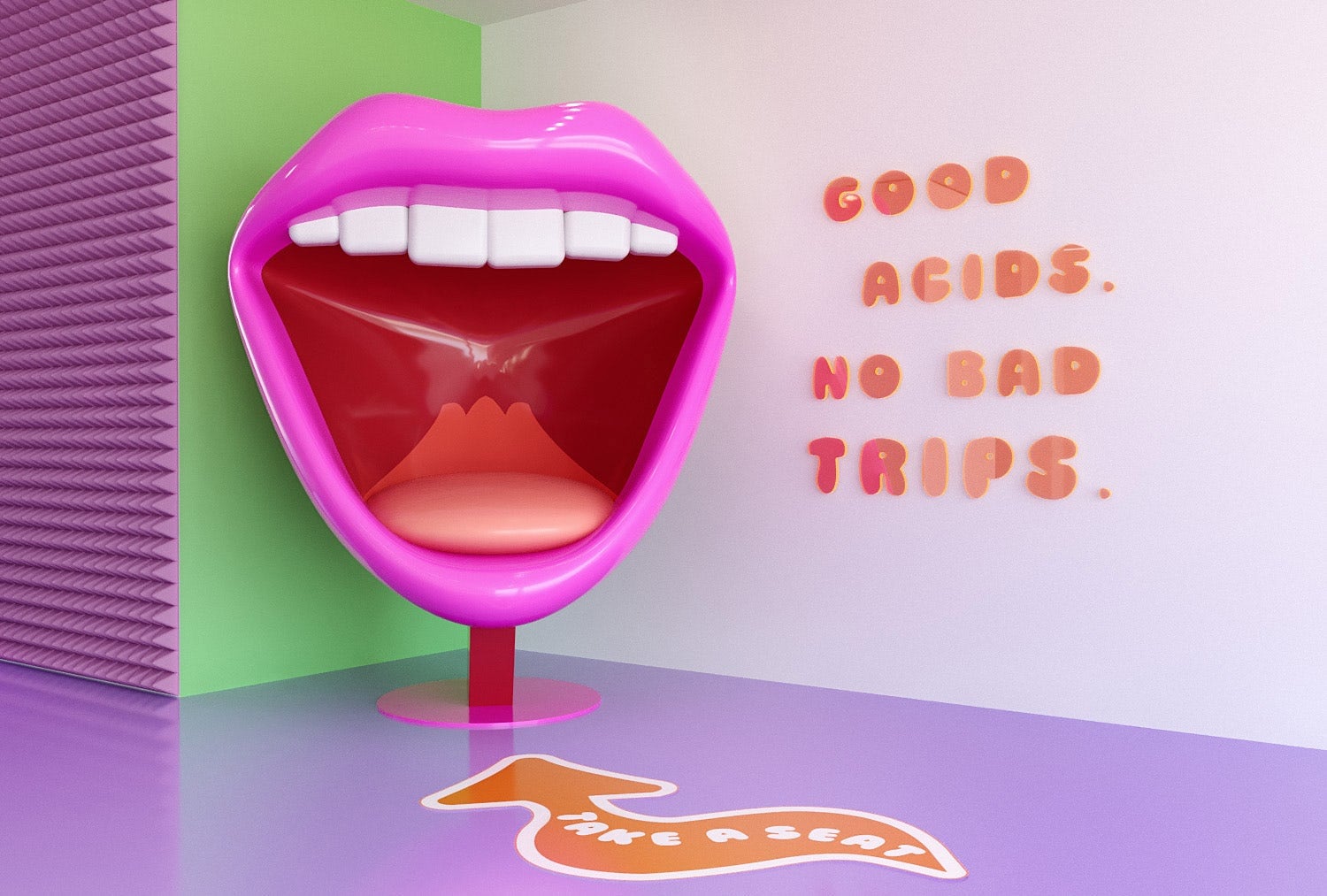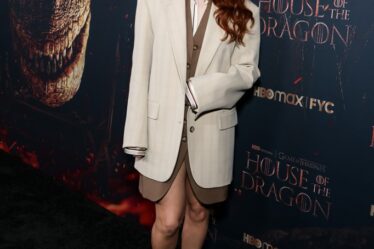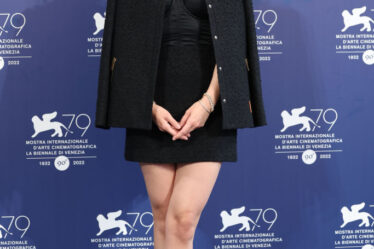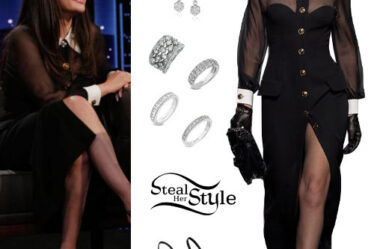
NEW YORK , United States — When Tiffany Masterson started Drunk Elephant, many retailers considered “clean skincare” products too niche for the beauty aisle. Fast forward four years and everyone from Sephora to Neiman Marcus is touting “clean” products, and Masterson is taking her brand global.
On Monday, the brand opened a two-story, heavy-on-the-pink “House of Drunk” in London’s Covent Garden to mark the company’s UK launch at SpaceNK and Cult Beauty. Guests were immersed in neon signage and social media photo ops, including a massive fuchsia tongue — a larger than life version of the image on the brand’s “Acid Trip Kit,” which contains skin-friendly concoctions like T.L.C. Framboos Glycolic Night Serum and Virgin Marula Luxury Face Oil.
The three-day pop-up marks the start of an expansion push that includes Drunk Elephant’s launch in Singapore – seen internally as a stepping stone to the rest of Asia – as well as the debut of a new retinol-based product that’s expected to become a big earner for the brand.
This is a show of strength from a company that, in the space of a few years, has become a top seller in the skincare category at Sephora and expects to exceed $100 million in sales by the end of 2018.
“I’ve never seen anything move and take off so quickly,” Tim Warner, chief executive of Drunk Elephant, told BoF in his first interview since joining the company last year after running Urban Decay for L’Oréal and Benefit Cosmetics for LVMH. “I’ve been with other brands that have definitely taken market share and caught everyone by surprise — but this is super fast.”
It’s visually arresting, educational and simple at the same time.
Masterson remains central to Drunk Elephant’s expansion plans and its appeal, using social media to spread the word about “clean compatible” — a skincare category whose name she coined, which prioritises transparency when it comes to ingredients and bars certain common cosmetics additives she dubs the “suspicious six.”
It helps that Drunk Elephant’s punchy neon caps and optic white packaging are “extremely photographable,” said Priya Venkatesh, senior vice president of merchandising, skincare and hair at Sephora. She said Drunk Elephant is “one of the fastest growing skincare lines in our history,” and is currently one of the retailer’s top three skincare brands.
“We have literally seen consumers stop to stare,” Venkatesh said of Drunk Elephant’s merchandise. “It’s visually arresting, educational and simple at the same time.”
Unlike direct-to-consumer beauty brands like Glossier, Drunk Elephant is relying on retail partners to expand internationally. Sephora drives the majority of sales in the US and Canada, and is expected to begin offering the brand at its locations in Singapore in November. Warner said other countries in Asia, including South Korea and China, will follow by 2020.
In the UK, products will be sold through Space NK shops and online via Cult Beauty, where Drunk Elephant is the most requested brand, said Alexia Inge, the online retailer’s co-founder. In Australia, the brand is sold through Mecca, a cosmetics chain, where it is the top-selling skincare product, according to a person familiar with the retailer’s sales.
While each retailer will put its own spin on welcoming the brand to the UK — SpaceNK invited VIP customers to experience the range and Cult Beauty tapped a handful of influencers to countdown to the online launch of the product — everything will live in the Drunk Elephant conceived “The House of Drunk.”
“Tiffany and I crystalised the brand codes over the past year, which started with the brand’s US presence in Sephora and are now extending abroad, starting with the UK,” said Lucia Perdomo-Ruehlemann, chief marketing officer at Drunk Elephant.
In the US, Warner intends to continue working exclusively with Sephora. “This is always my modus operandi: let’s focus on what we have and how big can we get it,” Warner said. “I’m more interested in how we do per door than how many doors we have.”
Warner said that Drunk Elephant’s on track to do “well in excess of $100 million” in net sales this year, more than quadruple the $25 million reported revenue from 2016. “It’s an important number to me,” Warner said, adding that Drunk Elephant has experienced triple digit year-over-year growth.
Drunk Elephant is on track to do well in excess of $100 million in net sales this year.
It was also about two years ago that the label started to attract the attention of major beauty players, Estée Lauder and L’Oréal among them, according to people familiar with the company.
When asked if Drunk Elephant could be sold in the near future, Warner replied that “it’s a little premature as of yet.”
“That will happen and it will come on its own if we just focus on our core and day to day businesses,” he said. “We don’t create a different strategy for that.”
It Cosmetics commanded a $1.2 billion price tag when it was acquired by L’Oréal in July of 2016. Just months later, Los Angeles-based Too Faced was snatched up by Estée Lauder for over $1.4 billion. Financial and industry experts predict that Drunk Elephant could be worth a similar amount in a sale.
Drunk Elephant stands out from other beauty brands frequently cited as acquisition targets, including Anastasia Beverly Hills and Huda Beauty, because it’s a skincare brand and not a colour cosmetics brand.
Drunk Elephant sells 17 products, whereas a colour cosmetics business can offer hundreds of varieties, said Robin Tsai, partner at VMG Ventures, which took a minority stake in the business in March 2017.
“From a productivity perspective it’s [Drunk Elephant] through the roof, but growth is mimicking, or even doing better than, super hot colour brands that people have seen,” he said.
Drunk Elephant can maintain its trajectory by growing in a “smart and strategic way,” as well as staying true to Masterson’s vision, said Ilya Seglin, managing director at Threadstone Advisors, an advisory and investment firm.
“There’s been nothing done to the brand to make it any less desirable for strategic [investors]… since VMG invested,” he said.
For Masterson, maintaining the brand’s integrity means sticking to her clean compatible ethos. Drunk Elephant falls into a middle ground, using some natural ingredients and some synthetic additives the brand deems safe, while avoiding others, including dying alcohols, essential oils and silicones.
“Clean to me today means if you put a clean product on your face or your body, if it gets into the bloodstream it’s not going to lead to disease or any kind of internal disruption,” she said. “It doesn’t mean all natural.”
Related Articles:
[ The Original Internet Beauty Brand Is Under AttackOpens in new window ]
[ How Skincare Brands Are Selling ScienceOpens in new window ]



